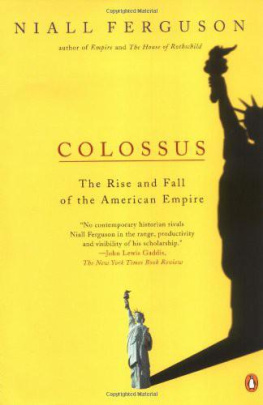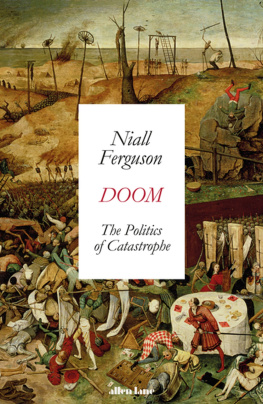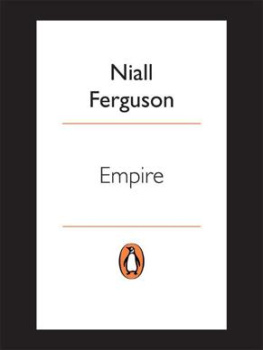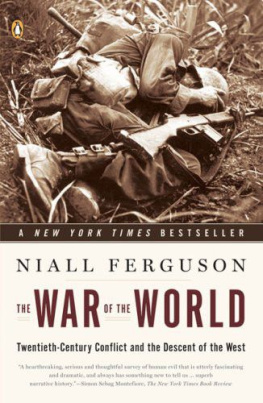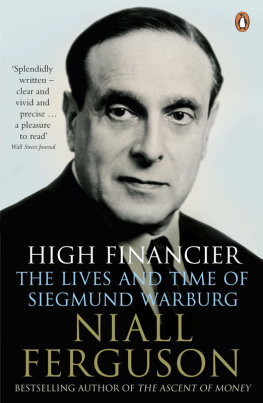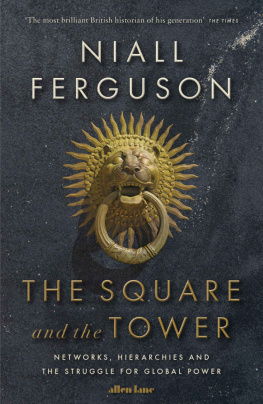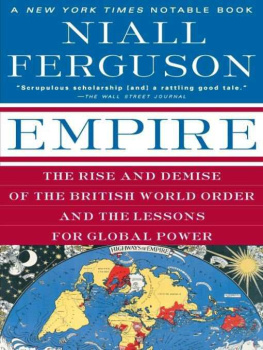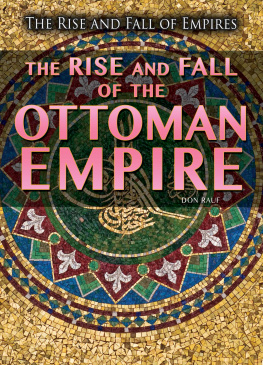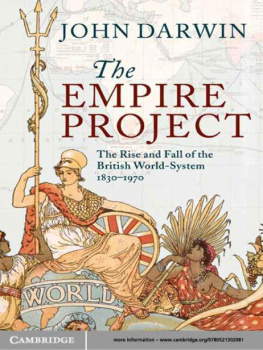NIALL FERGUSON
Colossus
The Rise and Fall of the American Empire
PENGUIN BOOKS
Contents
PENGUIN BOOKS
COLOSSUS
One of the worlds 100 most influential people Time Magazine
A talented controversialist. He brings a wealth of historical knowledge to bear on big questions Independent
In Colossus he turns his formidable powers of analysis toward the American Empire, offering a brief history as well as a provocative argument. it is sure to shake the assumptions of both fans and critics of the American Empire including those who deny that such a thing even exists Max Boot, author of The Savage Wars of Peace: Small Wars and the Rise ofAmerican Power
Illuminating, entertaining and often contentious The Times
Niall Ferguson takes as a premise that an American empire exists and that the world at large benefits from it. Even those who disagree with his perspective will find Colossus an immensely learned and useful book written with great verve and historical breadth William Roger Louis, author of The British Empire in the Middle East, 19451951
Every page of Colossus is provocative. Niall Ferguson poses and puts tentative answers to every question that foreigners ask about America and that Americans ought to ask about themselves Ernest May, author of Strange Victory: Hitlers Conquest of France and Imperial Democracy
Challenging and provocative Mail on Sunday
Niall Ferguson combines a prodigious output with clear, fluent writing and the all-too-rare ability to blend economic analysis with that of politics Economist
ABOUT THE AUTHOR
Niall Ferguson is Professor of International History at Harvard University, Senior Research Fellow of Jesus College, Oxford University, and a Senior Fellow of the Hoover Institution, Stanford University. He is the author of Paper and Iron, The House of Rothschild (two volumes), The Pity of War, The Cash Nexus, Empire and Colossus . He was also the editor of Virtual History . He lives in Oxfordshire with his wife and three children.
For John and Diana Herzog
Old Europe will have to lean on our shoulders, and to hobble along by our side, under the monkish trammels of priests and kings, as she can. What a colossus shall we be. THOMAS JEFFERSON, 1816 to me strength is my bane,
And proves the source of all my miseries;
So many, and so huge, that each apart
Would ask a life to wail, but chief of all,
O loss of sight, of thee I most complain!
Blind among enemies, O worse than chains,
Dungeon, or beggary, or decrepit age! MILTON, Samson Agonistes
Preface to the Paperback Edition
The aide said that guys like me were in what we call the reality-based community, which he defined as people who believe that solutions emerge from your judicious study of discernible reality. I nodded and murmured something about enlightenment principles and empiricism. He cut me off. Thats not the way the world really works anymore, he continued. Were an empire now, and when we act, we create our own reality. And while youre studying that realityjudiciously, as you willwell act again, creating other new realities, which you can study too, and thats how things will sort out. Were historys actors and you, all of you, will be left to just study what we do. RON SUSKIND, quoting a senior advisor to President Bush History, he said, shrugging, taking his hands out of his pockets, extending his arms, and suggesting with his body language that it was so far off. We wont know. Well all be dead. BOB WOODWARD, quoting President Bush
I set out to write this book in the belief that the role of the United States in the world today could be better understood by comparing it with past empires. I understood well enough that most Americans feel uneasy about applying the word empire to their country, though an influential minority (as the first epigraph above confirms) are not so inhibited. But what I had not fully understood until the first edition of Colossus was published was the precise nature of imperial denial as a national condition. It is, I discovered, acceptable among American liberals to say that the United States is an empireprovided that you deplore the fact. It is also permitted to say, when among conservatives, that American power is potentially beneficentprovided that you do not describe it as imperial. What is not allowed is to say that the United States is an empire and that this might not be wholly bad. Colossus set out to do this, and thereby succeeded in antagonizing both conservative and liberal critics. Conservatives repudiated my contention that the United States is and, indeed, has always been an empire. Liberals were dismayed by my suggestion that the American empire might have positive as well as negative attributes.
As in Gilbert and Sullivans Iolanthe , so in the United States today, it seems to be expected That every boy and every gal / Thats born into the world alive / Is either a little Liberal, / Or else a little Conservative! But I am afraid this book is neither. Here, in a simplified form, is what it says:
- that the United States has always been, functionally if not self-consciously, an empire;
- that a self-conscious American imperalism might well be preferable to the available alternatives, but
- that financial, human, and cultural constraints make such self-consciousness highly unlikely, and
- that therefore the American empire, in so far as it continues to exist, will remain a somewhat dysfunctional entity.
The case for an American empire in Colossus is therefore twofold. First, there is the case for its functional existence; second, the case for the potential advantages of a self-conscious American imperalism. By self-conscious imperialism, please note, I have never meant that the United States should unabashedly proclaim itself an empire and its president an emperor; perish the thought. I merely mean that Americans need to recognize the imperial characteristics of their own power today and, if possible, to learn from the achievements and failures of past empires. It is no longer sensible to maintain the fiction that there is something wholly unique about the foreign relations of the United States. The dilemmas faced by America today have more in common with those faced by the later Caesars than with those faced by the Founding Fathers.
At the same time, however, the book makes clear the grave perils of being an empire in denial. Americans are not wholly oblivious to the imperial role their country plays in the world. But they dislike it. I think were trying to run the business of the world too much, a Kansas farmer told the British author Timothy Garton Ash in 2003, like the Romans used to.
Of all the misconceptions that need to be dispelled here, this is perhaps the most obvious: That simply because Americans say they do not do empire, there cannot be such a thing as American imperialism. As I write, American troops are engaged in defending governments forcibly installed by the United States in two distant countries, Afghanistan and Iraq. They are likely to be there for some time to come; even President Bushs Democratic rival John Kerry implied in the first of last years presidential debates that, if he were elected, he would only begin to draw the troops down in six months. Empire also means economic, cultural, and political predominance within (and sometimes also without) that frontier. On November 6, 2003, in his speech to mark the twentieth anniversary of the National Endowment for Democracy, President Bush set out a vision of American foreign policy that, for all its Wilsonian language, strongly implied the kind of universal civilizing mission that has been a feature of all the great empires:
The United States has adopted a new policy, a forward strategy of freedom in the Middle East. The establishment of a free Iraq at the heart of the Middle East will be a watershed event in the global democratic revolution. The advance of freedom is the calling of our time; it is the calling of our country. We believe that liberty is the design of nature; we believe that liberty is the direction of history. We believe that human fulfillment and excellence come in the responsible exercise of liberty. And we believe that freedomthe freedom we prizeis not for us alone, it is the right and the capacity of all mankind.
Next page
